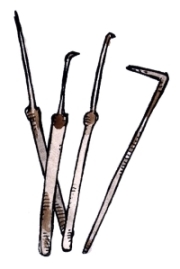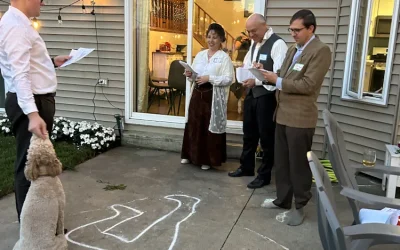A Heroic Death introduced a new concept for us – locations. And with locations comes rules for using them. We’ve since also use them in Lord and Lady Westing’s Will, and also the 7 expanded characters used for Murder at Sea. While each game will have its own specific location rules to suit that particular game, these are the rules upon which they are based.
Locations
Some locations within the game will contain important clues or items. These locations are not necessarily accessible to everyone (access may be restricted to those with a key or a special ability) and must be managed with location logs. The log is simply a sheet to track key information about the location – an example is below.

During the game, keep the log updated as things change. So if Cat Burglar sneaks into the room and steals the money, give her the money and update the log (cross off the money and make an entry in the notes to say that Cat stole the money).
Keeping the log up to date means that you don’t have to remember everything, and if you are using more than one host then the log keeps things consistent between them.
A couple of abilities that are relevant for locations:
- Observant: You are very observant: if you spend extra time studying an item or area, you can sometimes uncover additional information. See the Host for details.
- Pick lock: You can pick any lock. See the host for details.
Adding locations to existing games

You can, if you want, add these rules to one of our existing games. For example, you might want to create stateroom locations in Death on the Gambia so that the players have somewhere to hide their stuff. Here’s how you might go about that:
- First create a log for each stateroom.
- Decide on who can access each location – in this case I suggest whoever is staying in the stateroom, plus the Captain and the First Mate (you could make up some “Skeleton Key” cards for them).
- Decide who else might be able to access the room – some of the shady characters might have suitable skills. You could create lockpick item cards for them, or just remember that they’re the kinds of characters who could pick a lock and let them do so when they ask.
- Decide if any items start in those rooms – if you do this you will need to tell those characters that’s what you have done.
- You might also want to create some blank location logs – just in case someone during the game comes up with a good idea for a location.
You probably don’t want to create location logs for every single location in your game – that shouldn’t be necessary. (We only do it for key locations.) If you do, then you might want to think about some help as the host – you could give your co-host the job of looking after the locations./p>




0 Comments